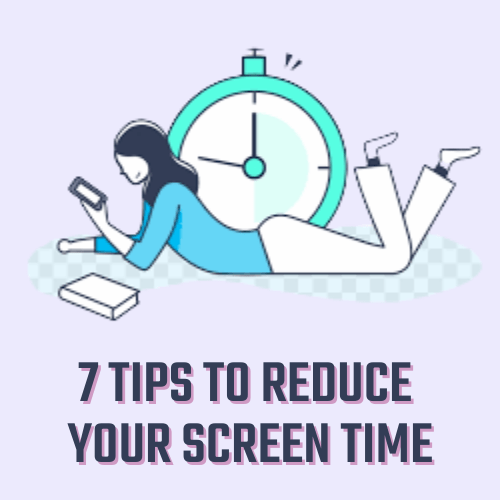Oh yes, it is an irony that you are reading this article on your screen. It’s like asking theif to protect your valueable. But we need to do it anyway. Most of us have become addicted to technology and living without screens have become next to impossible. Imagining a day without it is a scary thought. isn’t it! But what if one decides to go for that very much needed screen detox? How to reduce screen time?
Mobile and other smart devices have become a crucial part of our daily life in the current digital era. They give amusement, keep us organised, and keep us connected to the outside world. However frequent usage of mobile gadgets can cause addiction and harm to our physical and emotional health. In this post, we’ll go over some useful advice for users on how to regulate their screen time and avoid becoming addicted to their phones.
Set limits:
As most people tend to underestimate how much time they spend staring at screens, it’s a good idea to start by counting how much time you actually spend doing so, both during and after work. Setting limitations is one of the best strategies to manage screen time. You can establish a time limit for particular apps or activities using the built-in features of your mobile device. For social media apps like Facebook and Instagram, for instance, you may establish a time limit of one hour. There are many apps that can be used to limit screen time and lessen smartphone addiction. When you go over a predetermined time limit, these apps may track your usage and give you reminders. Moment, Offtime, and Forest are a few of the well-known apps.
Turn off notifications:
Disable your notifications to avoid being constantly tempted to check your phone and a major source of distraction. You can lessen your desire to use your mobile device frequently by disabling notifications for non-essential apps. Also, you can put your phone to “Do Not Disturb” mode when doing certain activities, including sleeping or working.
Also Read: Are You Ready For Digital Detox?
Create a schedule:
You may better manage your time and lower your chance of developing a mobile addiction by making a routine for your daily tasks. You can set aside particular hours for various activities like work, exercise, and leisure. You’ll be able to clearly distinguish between appropriate and inappropriate times to use your mobile device after completing this.
Use the 20-20-20 rule:
The 20-20-20 rule is a well-known method for easing eye strain and fatigue brought on by prolonged screen use. The guideline states that you must glance at something that is 20 feet away for 20 seconds every 20 minutes. You can lessen eye strain and enhance your general health by doing this.
Engage in offline activities
Although it can be challenging to step away from our devices, scheduling time to do anything offline can give your eyes the rest they need.
On workdays, you can carry out routine tasks like grocery shopping and working out in the gym. You can enjoy yourself on the weekends by going shopping, hiking, or getting a massage. Finding something to do that is more appealing than swiping on a phone is crucial.
Avoid eating in front of a screen
It can be really pleasurable to use your phone as entertainment while you’re eating. Because you’re doing two tasks at once, it also fosters a sense of productivity. But if you want to finish the show you started at the beginning of the meal, you’ll probably spend more time in front of your device. Also, eating in front of a screen causes you to pay less attention to your meal, which encourages overeating. Learn to put your smartphone aside and engage in mindful dining to cut down on your screen time.
Practice mindfulness:
You can improve your awareness of your thoughts, behaviours, and use of mobile devices by engaging in mindfulness practices. Deep breathing and mindfulness practices like meditation can help you maintain your focus and lessen your propensity to check your phone frequently.
In conclusion, a key source of stress that can harm both our mental and physical health is mobile addiction. Users can limit their screen time and lower their chance of developing a mobile addiction by adhering to the helpful advice provided above. Users can lead a balanced and healthy lifestyle by setting limits, using applications, turning off notifications, making a plan, following the 20-20-20 rule, and engaging in mindfulness exercises.



